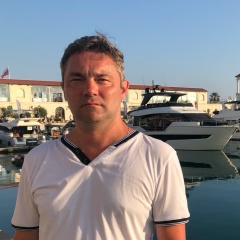В конце мая 1940 года ошарашенные танковым напором немцев британцы и французы были отброшены к морю в районе прибрежного французского курорта Дюнкерк. Немецкие генералы поняв, что с ходу группировку в 400 тысяч солдат им не осилить, решили взять тайм-аут и наступление на прижатых к пляжу союзников остановилось. Геринг как всегда пафосно пообещал решить проблему с помощью авиации - одно из первых его обещаний, которое он не смог выполнить, но далеко не последнее. Британцев утюжили бомбардировщики и артиллерия. Солдаты и многие офицеры были полностью деморализованы. Черчилль и морское командование, естественно, не стали мириться со сложившейся ситуацией, и началась эвакуация. Стоит отметить, что когда говорят, что киношники сделали из поражения блокбастер - это не так. Сама операция "Динамо" - это как раз победа антигитлеровской коалиции. Позорным поражением было то, что происходило в Бельгии до нее. А так удалось спасти около 350 тысяч человек. Французов спасшихся (среди них был знаменитый историк Марк Блок) так вообще успели переправить из Англии в Нормандию, где они и встретили капитуляцию Франции. Англичане бросили технику, горючее, оружие, но людей почти всех спасли. Не повезло только двум французским дивизиям - на них плавсредств уже не оставалось, да и немцы "проснулись". Огромную роль сыграла пассионарность британских гражданских моряков и владельцев яхт, которые откликнулись на призыв ВМФ и провели несколько незабываемых дней в Ла-Манше с солдатами на борту и вражескими бомбардировщиками над головой. Многие погибли.
При этом Дюнкерк уже был запечатлен на киноэкране недавно. Джо Райт в "Искуплении" снял шедевральные 5 минут пляжа одним проездом камеры, без монтажа, показав всю деморализованность британцев. Отдельно порадовала матчасть - грузовики, мотоциклы, зенитки, импровизированные брустверы из ящиков и мешков, французские кавалеристы, проносящиеся галопом. И все это под прекрасную музыку Дарио Марианелли. Красота!
И вот на цель уже заходит Кристофер Нолан. Это очень британский фильм. Наверное, самый британский у Нолана. Не блокбастер с голливудской эпичностью и экшном. Это прежде всего триллер на тему войны, а точнее эмоций людей, либо попавших в страшную ловушку, либо спасающих первых из нее. Это не масштабная реконструкция эвакуации - порой кажется что сам "карман" занимает всего 2 квадратных километра. Море не усеяно эсминцами, в небе нет эскадрилий Хейнкелей или Юнкерсов. В отличие от "Искупления" пляж не заполнен толпой в 100500 человек и не завален брошенной техникой. А жаль! Многие черты обстановки (и даже сценарные ходы) достаточно условны. Вообще у "заклепочников" и "панзерзадротов" фильм вызвал нехилую такую бурю. Нолан кажется и не ставил перед собой задачу детального воспроизведения технических сторон, ему важно было погрузить зрителя в засасывающую, жуткую и психоделическую атмосферу катастрофы. И у него это получается. При этом по своей доброй традиции он вновь играет с сюжетом и зрителем - фильм одновременно действует в трех разных временных отрезках. Голову придется немного напрячь при просмотре!
Британские солдаты - не агнцы божие. Пытаются спастись самыми разными хитрыми способами, пробуждается паранойя и шпиономания, желание выжить, идя по головам, крыша неплохо у некоторых едет. Но трудно винить их в этой ситуации. Кругом царит хаос войны. Врага нет, он незрим, только машины несущие смерть. Монотонная, но очень цепляющая музыка Ханса Циммера очень помогает созданию мрачной атмосферы. В треках тикают личные часы Нолана, как бы напоминая о быстротечности этой игры людей со своей судьбой. Операторская работа как всегда на уровне.
Персонажи не очень прописаны, но лично я им сопереживал. Видимо, сказалось знание бэкграунда. Самый крутой герой фильма - конечно же владелец яхты, отправившийся спасать солдат с двумя своими сыновьями. Очень британский типаж спокойного целеустремленного стоика. Одним из прототипов этого персонажа стал Чарльз Лайтолер, помощник капитана "Титаника", позажигавший и в мае 40-го. Том Харди в роле мужественного пилота RAF хорош, но ему и играть практически ничего не пришлось, но за Хейнкелями охотится здорово! Кеннет Брана сыграл своего коммандера тоже на уровне. В конце его идеалистичный поступок, правда, вызвал недоумение, но это мелочи. При этом у его прототипа коммандера Джеймса Клоустона очень трагическая судьба в конце операции "Динамо". Но это осталось вне рамок фильма.
В общем, хороший (но далеко не самый лучший) фильм Кристофера Нолана об эмоциях поражения, мужестве и попытках обыграть смерть (или судьбу). Это военная драма, но не историческая реконструкция.
При этом Дюнкерк уже был запечатлен на киноэкране недавно. Джо Райт в "Искуплении" снял шедевральные 5 минут пляжа одним проездом камеры, без монтажа, показав всю деморализованность британцев. Отдельно порадовала матчасть - грузовики, мотоциклы, зенитки, импровизированные брустверы из ящиков и мешков, французские кавалеристы, проносящиеся галопом. И все это под прекрасную музыку Дарио Марианелли. Красота!
И вот на цель уже заходит Кристофер Нолан. Это очень британский фильм. Наверное, самый британский у Нолана. Не блокбастер с голливудской эпичностью и экшном. Это прежде всего триллер на тему войны, а точнее эмоций людей, либо попавших в страшную ловушку, либо спасающих первых из нее. Это не масштабная реконструкция эвакуации - порой кажется что сам "карман" занимает всего 2 квадратных километра. Море не усеяно эсминцами, в небе нет эскадрилий Хейнкелей или Юнкерсов. В отличие от "Искупления" пляж не заполнен толпой в 100500 человек и не завален брошенной техникой. А жаль! Многие черты обстановки (и даже сценарные ходы) достаточно условны. Вообще у "заклепочников" и "панзерзадротов" фильм вызвал нехилую такую бурю. Нолан кажется и не ставил перед собой задачу детального воспроизведения технических сторон, ему важно было погрузить зрителя в засасывающую, жуткую и психоделическую атмосферу катастрофы. И у него это получается. При этом по своей доброй традиции он вновь играет с сюжетом и зрителем - фильм одновременно действует в трех разных временных отрезках. Голову придется немного напрячь при просмотре!
Британские солдаты - не агнцы божие. Пытаются спастись самыми разными хитрыми способами, пробуждается паранойя и шпиономания, желание выжить, идя по головам, крыша неплохо у некоторых едет. Но трудно винить их в этой ситуации. Кругом царит хаос войны. Врага нет, он незрим, только машины несущие смерть. Монотонная, но очень цепляющая музыка Ханса Циммера очень помогает созданию мрачной атмосферы. В треках тикают личные часы Нолана, как бы напоминая о быстротечности этой игры людей со своей судьбой. Операторская работа как всегда на уровне.
Персонажи не очень прописаны, но лично я им сопереживал. Видимо, сказалось знание бэкграунда. Самый крутой герой фильма - конечно же владелец яхты, отправившийся спасать солдат с двумя своими сыновьями. Очень британский типаж спокойного целеустремленного стоика. Одним из прототипов этого персонажа стал Чарльз Лайтолер, помощник капитана "Титаника", позажигавший и в мае 40-го. Том Харди в роле мужественного пилота RAF хорош, но ему и играть практически ничего не пришлось, но за Хейнкелями охотится здорово! Кеннет Брана сыграл своего коммандера тоже на уровне. В конце его идеалистичный поступок, правда, вызвал недоумение, но это мелочи. При этом у его прототипа коммандера Джеймса Клоустона очень трагическая судьба в конце операции "Динамо". Но это осталось вне рамок фильма.
В общем, хороший (но далеко не самый лучший) фильм Кристофера Нолана об эмоциях поражения, мужестве и попытках обыграть смерть (или судьбу). Это военная драма, но не историческая реконструкция.
At the end of May 1940, the British and French, stunned by the tank pressure of the Germans, were thrown to the sea in the area of the coastal French resort of Dunkirk. The German generals, realizing that they could not overpower the group of 400 thousand soldiers on the move, decided to take a timeout and the attack on the allies pressed to the beach stopped. Goering, as always, pathetically promised to solve the problem with the help of aviation - one of his first promises, which he could not fulfill, but far from the last. The British were ironed by bombers and artillery. The soldiers and many officers were completely demoralized. Churchill and the naval command, of course, did not put up with the situation, and the evacuation began. It is worth noting that when they say that filmmakers made a blockbuster out of defeat, this is not so. Operation Dynamo itself is precisely the victory of the anti-Hitler coalition. A shameful defeat was what happened in Belgium before her. And so it was possible to save about 350 thousand people. The French who escaped (among them the famous historian Mark Blok) so managed to transport from England to Normandy, where they met the surrender of France. The British threw equipment, fuel, weapons, but they saved almost everyone. Only two French divisions were unlucky - they had no watercraft left, and the Germans "woke up". A huge role was played by the passionarity of British civilian sailors and yacht owners who responded to the call of the Navy and spent several unforgettable days in the English Channel with soldiers on board and enemy bombers overhead. Many died.
At the same time, Dunkirk was already captured on the movie screen recently. Joe Wright in the Atonement took off a masterpiece of 5 minutes of the beach with one camera pass, without editing, showing all the demoralization of the British. Separately pleased with the materiel - trucks, motorcycles, anti-aircraft guns, improvised parapet from boxes and sacks, French cavalrymen galloping. And all this to the beautiful music of Dario Marianelli. Beauty!
And now Christopher Nolan is already on the target. This is a very British film. Probably the most British among Nolan. Not a blockbuster with Hollywood epic and action. This is primarily a thriller on the theme of war, or rather, the emotions of people who either fell into a terrible trap or save the first from it. This is not a large-scale reconstruction of the evacuation - sometimes it seems that the “pocket” itself takes up only 2 square kilometers. The sea is not dotted with destroyers, there are no Heinkels or Junkers squadrons in the sky. Unlike the Atonement, the beach is not filled with a crowd of 100,500 people and is not littered with abandoned equipment. It's a pity! Many features of the situation (and even scenario moves) are rather arbitrary. In general, the “riveters” and “panzadzadrotov” film caused a sickly storm. It seems that Nolan did not set himself the task of reproducing the technical aspects in detail, it was important for him to immerse the viewer in the sucking, creepy and psychedelic atmosphere of the disaster. And he does it. Moreover, in his good tradition, he again plays with the plot and the audience - the film simultaneously operates in three different time periods. Head will have to strain a bit when watching!
British soldiers are not God's lambs. They try to escape in a variety of tricky ways, paranoia and spy mania awaken, the desire to survive, going over their heads, the roof is going pretty well for some. But it's hard to blame them for this situation. Around reigns chaos of war. There is no enemy, he is invisible, only machines that bring death. The monotonous but very catchy music of Hans Zimmer helps a lot to create a gloomy atmosphere. Nolan’s personal clock is ticking in the tracks, as if recalling the transience of this game of people with their own destiny. Camera work as always on the level.
The characters are not very spelled out, but I personally empathized with them. Apparently, knowledge of the background affected. The coolest hero of the film is, of course, the owner of the yacht, who went to rescue the soldiers with his two sons. Very British type of calm purposeful stoic. One of the prototypes of this character was Charles Lightoler, assistant captain of the Titanic, who also set fire to May 40th. Tom Hardy in the role of the brave RAF pilot is good, but he didn’t have to play anything, but Heinkel hunts great! Kenneth Branagh played his commander also on the level. In the end, his idealistic act, however, was bewildering, but these are trifles. At the same time, his prototype commander James Clawston has a very tragic fate at the end of Operation Dynamo. But that was left out of the film.
In general, Christopher Nolan’s good (but far from the best) film about emotions of defeat, courage and attempts to beat death (or fate). This is a military drama, but not a historical reconstruction.
At the same time, Dunkirk was already captured on the movie screen recently. Joe Wright in the Atonement took off a masterpiece of 5 minutes of the beach with one camera pass, without editing, showing all the demoralization of the British. Separately pleased with the materiel - trucks, motorcycles, anti-aircraft guns, improvised parapet from boxes and sacks, French cavalrymen galloping. And all this to the beautiful music of Dario Marianelli. Beauty!
And now Christopher Nolan is already on the target. This is a very British film. Probably the most British among Nolan. Not a blockbuster with Hollywood epic and action. This is primarily a thriller on the theme of war, or rather, the emotions of people who either fell into a terrible trap or save the first from it. This is not a large-scale reconstruction of the evacuation - sometimes it seems that the “pocket” itself takes up only 2 square kilometers. The sea is not dotted with destroyers, there are no Heinkels or Junkers squadrons in the sky. Unlike the Atonement, the beach is not filled with a crowd of 100,500 people and is not littered with abandoned equipment. It's a pity! Many features of the situation (and even scenario moves) are rather arbitrary. In general, the “riveters” and “panzadzadrotov” film caused a sickly storm. It seems that Nolan did not set himself the task of reproducing the technical aspects in detail, it was important for him to immerse the viewer in the sucking, creepy and psychedelic atmosphere of the disaster. And he does it. Moreover, in his good tradition, he again plays with the plot and the audience - the film simultaneously operates in three different time periods. Head will have to strain a bit when watching!
British soldiers are not God's lambs. They try to escape in a variety of tricky ways, paranoia and spy mania awaken, the desire to survive, going over their heads, the roof is going pretty well for some. But it's hard to blame them for this situation. Around reigns chaos of war. There is no enemy, he is invisible, only machines that bring death. The monotonous but very catchy music of Hans Zimmer helps a lot to create a gloomy atmosphere. Nolan’s personal clock is ticking in the tracks, as if recalling the transience of this game of people with their own destiny. Camera work as always on the level.
The characters are not very spelled out, but I personally empathized with them. Apparently, knowledge of the background affected. The coolest hero of the film is, of course, the owner of the yacht, who went to rescue the soldiers with his two sons. Very British type of calm purposeful stoic. One of the prototypes of this character was Charles Lightoler, assistant captain of the Titanic, who also set fire to May 40th. Tom Hardy in the role of the brave RAF pilot is good, but he didn’t have to play anything, but Heinkel hunts great! Kenneth Branagh played his commander also on the level. In the end, his idealistic act, however, was bewildering, but these are trifles. At the same time, his prototype commander James Clawston has a very tragic fate at the end of Operation Dynamo. But that was left out of the film.
In general, Christopher Nolan’s good (but far from the best) film about emotions of defeat, courage and attempts to beat death (or fate). This is a military drama, but not a historical reconstruction.




У записи 15 лайков,
0 репостов,
417 просмотров.
0 репостов,
417 просмотров.
Эту запись оставил(а) на своей стене Константин Макаров




































